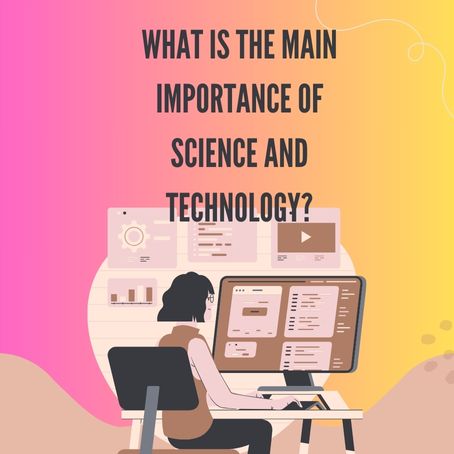Problems and Challenges of Science and Technology
Science and technology have left an indelible mark throughout the evolution of civilisation as we know it. Almost every aspect of humanity has been impacted. They have been the prime mover of changes from the early days of mankind through the ages up to the society we live in today. To measure the value that they have brought into a society, it suffices to mention a few aspects of life which include: health, education, communication, industry, environment, etc. This article therefore discusses the major importance of Science and Technology as well as the relevance they continue to provide in the contemporary world.
Expanded Horizons of Human Knowledge
To put it simply, Science is the area that enhances the knowledge of humanity by posing the most serious and even the most mundane questions: how does one apprehend reality? There are seeing and there are propositions too, only to discard them as one attempts to find the one which explains how things operate. But in saying that, let’s not forget that while Science is about asking questions, Technology is more of a hands-on aspect – it’s about applying Science in order to create something that has a definite aim or solves a problem. As it has already been said, together, Science and Technology are the peak aspects of the human race; they are answers to matters including human existence as well as matters of the universe and even life itself.
For example, thanks to scientific research around the world, COVID-19 vaccines can be produced in a very short amount of time which is a big indicator of technology this globe is witnessing. Similarly, MRI machines, artificial organs, and health monitors have amazing accuracy in diagnostics and great performance in patients.
Economic Development and Industrialisation
Technology and the modernisation of science are major points responsible for the deepening and industrialisation of a society. They permit the establishment of new industries, growth in the volume of production, and better quality of the products and services rendered. The most recent technologies that changed production, transport, etc., are automation, AI, and the Internet of Things.
On top of that, solar panels and wind turbines, along with other renewable marketing technologies are also coming up with distinct business models. For instance, high-tech states like the USA, China and South Korea have a greater economic edge over other countries as they concentrate on science and technology.
Enhancing Communication
Thanks to myriad factors in science and technology, communication has been transformed. To illustrate, the evolution of the printing press, the emergence of the World Wide Web and, even, the development of mobile phones have allowed communication to be more effective with lower costs.
The primary advantage of internet use is enabling seamless interactions among people regardless of their physical location allowing them to communicate and engage in activities at the same time. Personal or business relations have greatly been altered by social networks, video calls, text messaging and other forms of communication across the globe including education, entertainment and even commerce. Due to cultural contact, the exchange of concepts and ideas has facilitated international relations.
Change in Education
Education has improved. Science and technology have made it so that there are fewer barriers to learning. The rise of technology in the form of aids, online learning, and blended learning has supported education. These resources have also been available all over the world which now allows students to be able to learn regardless of their location.
Nowadays, students can more easily understand some of the more complicated concepts thanks to VR technology as well as AR. Moreover, students, who tend to be stubborn, now have an opportunity to learn in the way that is more suitable for them with various deals created with AI-based systems.
We need technology that will in the short run serve as a solution to climate change, pollution, and over-dependence on natural resources such as renewable energy, waste disposal systems and environmental monitoring systems.
To demonstrate, the science of ever-increasing temperatures has come into existence in order to try and explain burning heating and its impacts, which has in turn contributed to the possible ways of containing threats posed by climate change. New technologies have enabled all sorts of electric vehicles, smart grids, and carbon capture technology.
Improving Living Standards
The penetration of technologies and science into society has increased living standards by performing dirty and monotonous tasks which would have been impossible to do one hundred years ago. Appliances in houses, means of transport and entertainment have replaced what life used to be, and most definitely will be easy and practical.
Fostering New Ideas and New Possibilities
The creative fusion of science and technology provides the desired context for ideas to be transformed into real products which are of use to society while inspiring the inventive spirit. The relationship in this form acts like the force in the engine of growth or development enabling people to explore more possibilities, more frontiers and more heights.
In the same vein, AI amplified the facets of human nature in the arts and literature due to its tool that has been pushing the limits of human capabilities, and the range of creativity has indeed been increased. In the same way, the production industry has evolved and improved by 3D technology because of the effectiveness in the timeline of prototyping and manipulating complex shapes.
Global Challenges and Solutions
As seen in global pandemics, food crises, and other disasters, science and technology function as one of the critical parts in addressing the issues. This can reasonably be understood in the sense of technological aspects concerning problem solving with capabilities of addressing pattern recognition, forecasting, and problem response.
Hurricane Sandy and tropical storm Debbie are cases in point. They have demonstrated how satellite imaging can limit the extent of the damage during the hurricanes. Biotechnology’s GMOs allow for greater efficiency of food production in a dynamically retained global population.
Empowering Societies
Finally, Science and Technology also empower societies through sharpening their critical, creative and cooperative skills. They again, assist individuals in making thoughtful choices, and enhancing society through learning, asking questions and innovating.
In addition, technology has also enabled greater accountability and efficiency in governance and provision of public services. For example, e-governance mechanisms enhance citizen participation and improve the delivery of services by the government.
The importance of science and technology cannot be overemphasised. They are the building blocks of the present man-powered civilisation all over the world, promoting growth and searching for answers to the global issues of our time. In advancing mankind, science and technology have contributed to enhancing health and education, growing economies, and protecting the environment. And as we grow more and venture into different spaces, their role in defining the future will supersede that of the past. The major problem is that they should be designed in such a way as to improve the human race rather than destroy it, by integrating ethical considerations, inclusiveness, and sustainable principles.

